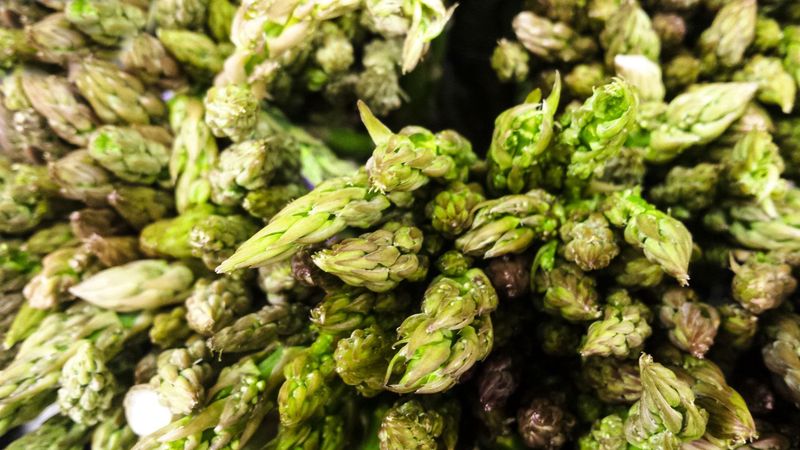Asparagus is a beloved vegetable known for its nutritional benefits, but moderation is key. Eating too much asparagus can lead to some unwanted side effects.
Here are seven reasons why you should avoid overindulging in this green delight.
1. Digestive Discomfort
Asparagus is packed with fiber, a nutrient essential for good digestion. However, overconsumption can lead to gas and bloating, especially for those not accustomed to a high-fiber diet.
The stomach cramps that follow can be quite uncomfortable. Introducing asparagus gradually into your meals may help mitigate these effects. If digestive discomfort persists, reducing intake is advisable.
These symptoms are a reminder that balance is crucial. For individuals with irritable bowel syndrome, caution is particularly important. Always pay attention to your body’s signals when incorporating fiber-rich foods like asparagus.
2. Strong-Smelling Urine
Eating asparagus can lead to a notable change in urine odor due to asparagusic acid. This compound breaks down into sulfur-containing chemicals, which create the distinctive smell.
Although harmless, this effect can be surprising if you’re not expecting it. The odor can appear within just 15 minutes of consumption. While not everyone experiences this phenomenon, it’s quite common.
Drinking plenty of water may dilute the smell, making it less noticeable. Some find the scent amusing, while others may be more sensitive to it. Either way, it’s a quirky outcome of enjoying asparagus.
3. Kidney Strain
Asparagus is rich in purines, compounds that break down into uric acid. For some individuals, high levels of uric acid can contribute to kidney stone formation. Maintaining a balanced diet helps in preventing this issue.
If you are prone to kidney stones, it might be wise to limit asparagus intake. Staying hydrated is also essential, as it aids in flushing out excess uric acid. Consult with a healthcare provider if you have concerns about asparagus and kidney health.
Awareness and moderation can prevent potential complications.
4. Potential for Allergies
Though rare, asparagus can trigger allergic reactions in some individuals. Symptoms may include skin rashes, itching, or respiratory issues such as sneezing. Such reactions are more likely if you have other food allergies or pollen sensitivities.
If you notice any adverse reactions after eating asparagus, it’s best to consult an allergist. Sometimes, cooking asparagus thoroughly can reduce allergenic properties.
However, if allergies are suspected, eliminating asparagus from your diet might be necessary. Always keep an eye on how your body reacts to new foods.
5. Drug Interactions
Asparagus has natural diuretic properties, which can affect how certain medications work, especially those for blood pressure or kidney conditions. If you’re on medication, it’s wise to discuss your asparagus consumption with a healthcare professional.
Diuretics increase urine production, potentially altering the effectiveness of your medication. Therefore, monitoring your diet and medication is crucial. This doesn’t mean you need to avoid asparagus entirely, but moderation is important.
Adjusting your intake may be necessary to maintain balance and health.
6. Blood Sugar Impact
Large quantities of asparagus may impact blood sugar levels, which is particularly important for diabetics. This green vegetable, though healthy, can influence insulin and glucose dynamics when eaten in excess.
Keeping an eye on portion sizes ensures that asparagus remains beneficial rather than problematic. If you have diabetes, monitoring how asparagus affects your blood sugar is key.
Incorporating asparagus into a balanced meal plan, rather than eating it in isolation, may help maintain stable levels. Always consult with healthcare professionals regarding dietary choices.
7. Vitamin K Overload
Asparagus is an excellent source of vitamin K, essential for blood clotting. However, excessive intake can interfere with blood-thinning medications like warfarin. If you’re on such medications, regulating your vitamin K intake is crucial.
This doesn’t mean eliminating asparagus, but rather balancing it with other foods. Keeping track of your daily vitamin K consumption helps maintain its benefits without compromising medication effectiveness.
Discussing your diet with a doctor can provide guidance. Remember, moderation ensures asparagus remains a beneficial part of your diet.







